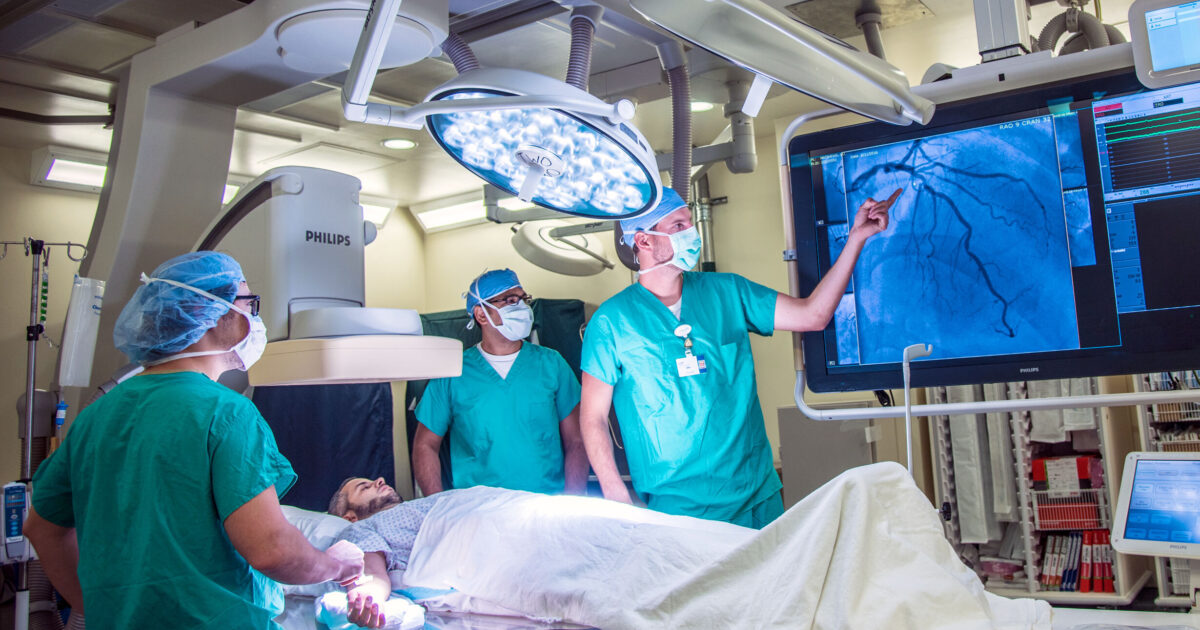What to do after your Cardiologist near me appointment
What to do after your Cardiologist near me appointment
Blog Article
Recognizing the Significance of Cardiology in Modern Medical Care Providers
Cardiology plays an important duty in modern health care, specifically as heart disease proceeds to be the leading reason of death worldwide. Advancements in diagnostics and treatment have transformed individual treatment, making it possible for earlier treatments and improved results. In addition, the change in the direction of preventative cardiology encourages individuals to manage their health and wellness proactively. As technology continues to develop, the combination of innovative solutions may further redefine cardiology's effect on public wellness, triggering a more detailed examination of emerging patterns and their ramifications.
The Occurrence of Heart Condition and Its Impact on Public Health And Wellness
Heart condition continues to be the leading reason of fatality globally, its influence expands much past individual patients to affect public health systems and economic situations. The high prevalence of heart problem positions a substantial stress on healthcare resources, demanding enhanced financing for prevention, treatment, and rehab programs. Public health and wellness campaigns must resolve danger aspects such as obesity, smoking, and inactive way of lives, which add substantially to the rising occurrence of heart conditions.Moreover, the economic problem related to cardiovascular disease is enormous, including not only direct clinical prices but likewise indirect costs connected to shed efficiency and early death. Areas face challenges in managing these expenses, commonly leading to differences in medical care accessibility and end results. As the populace ages and lifestyle-related dangers proceed to rise, the urgency for effective cardiology interventions comes to be paramount. Subsequently, addressing heart condition is not only a matter of individual health and wellness but additionally a crucial public wellness top priority.
Advances in Heart Diagnostics and Imaging Techniques
Current improvements in heart diagnostics and imaging techniques have actually reinvented the area of cardiology, improving the capability to detect and keep track of heart problem. Techniques such as cardiac MRI, CT angiography, and echocardiography have actually ended up being increasingly sophisticated, supplying detailed pictures of cardiac structures and features. These techniques enable the very early recognition of problems like coronary artery condition, heart failure, and valvular disorders.Moreover, advancements in non-invasive diagnostics, such as wearable innovation and remote tracking devices, have encouraged patients and healthcare service providers. These tools assist in real-time monitoring of heart rhythms and other vital signs, leading to timely treatments. Furthermore, expert system is being incorporated right into imaging analysis, improving accuracy and performance in diagnosis.
Technologies in Treatment Choices for Heart Issues
Current innovations in cardiology have actually resulted in significant technologies in treatment alternatives for heart conditions. These consist of sophisticated medical methods that enhance procedural outcomes and emerging medicines that supply brand-new opportunities for treatment. As the area evolves, these advancements play a vital duty in enhancing client care and outcomes.
Advanced Surgical Techniques
Developments in surgical techniques have transformed the landscape of cardiology, supplying new hope for patients with heart conditions. Minimally intrusive procedures, such as catheter-based treatments, have significantly lowered recovery times and hospital stays. Methods like robotic-assisted surgical treatment boost accuracy, permitting doctors to navigate intricate physiological structures with better precision. Advancements in imaging modern technology help with real-time visualization during treatments, improving outcomes. Transcatheter aortic shutoff replacement (TAVR) exemplifies an advancement in treating aortic constriction, allowing shutoff substitute without open-heart surgical treatment. Additionally, hybrid approaches that incorporate catheter-based and medical approaches give customized options for different heart issues. These sophisticated medical techniques not just improve person safety and security however likewise broaden treatment alternatives, emphasizing the important function of technology in modern cardiology practices.
Emerging Treatments and medicines
As the landscape of cardiology continues to develop, emerging medications and treatments play a critical role in improving therapy alternatives for heart disease. Innovations such as novel anticoagulants and progressed lipid-lowering representatives have changed the administration of heart diseases, greatly minimizing patient morbidity and death. In addition, the advancement of gene therapies and regenerative medication supplies encouraging avenues for treating conditions formerly deemed irreparable. Medical trials are continually disclosing the efficacy of these treatments, pressing the limits of standard therapies. The assimilation of electronic wellness modern technologies promotes tailored medication, enabling for tailored treatment plans based on genetic and way of life variables. Jointly, these improvements emphasize the dynamic nature of cardiology, improving person outcomes and redefining standards of care in contemporary healthcare.
The Function of Preventive Cardiology in Patient Treatment
Preventative cardiology plays a vital role in individual treatment by concentrating on the identification of danger variables that contribute to heart problem. Via lifestyle modification techniques and early detection methods, medical care service providers can efficiently minimize the incidence of cardiovascular events - Dr Garcia. This positive strategy not just enhances client results however additionally advertises long-term wellness
Danger Variable Identification
While heart diseases continue to be a leading reason of morbidity and death worldwide, effective threat aspect identification acts as a keystone of precautionary cardiology. Identifying threat elements such as high blood pressure, family members, diabetes mellitus, and hyperlipidemia background is crucial for very early intervention. Medical care experts use different evaluating methods to review these factors, permitting for tailored safety nets. Furthermore, recognizing a patient's lifestyle options, such as cigarette smoking and physical inactivity, even more notifies risk assessments. This complete evaluation allows clinicians to establish tailored care strategies targeted at mitigating threats. By prioritizing danger variable identification, healthcare systems can improve individual outcomes and minimize the overall problem of cardiovascular diseases, ultimately adding to enhanced public health strategies and source allocation.
Way Of Life Adjustment Strategies
A multitude of researches highlights the important duty of way of living modification strategies in minimizing heart disease risk. These methods incorporate dietary modifications, enhanced exercise, smoking cigarettes cessation, and weight administration. By taking on a heart-healthy diet plan abundant in fruits, veggies, entire grains, and lean proteins, people can lower cholesterol levels and blood pressure. Routine physical task strengthens the heart and boosts general cardio health. Furthermore, giving up smoking greatly lowers the danger of heart condition and improves recuperation rates for those with present conditions. Weight monitoring better adds to cardio health by alleviating other threat aspects such as diabetes mellitus and high blood pressure. Applying these lifestyle alters not only promotes private health however also works as a cornerstone of preventive cardiology in individual care.
Very Early Detection Techniques
Way of living modifications substantially add to reducing heart disease risks, however they are most efficient when coupled with very early detection strategies. Precautionary cardiology emphasizes the value of identifying potential heart concerns before they intensify into major problems. Techniques such as blood pressure monitoring, cholesterol screening, and progressed imaging innovations like echocardiograms play vital functions in evaluating cardiovascular health and wellness. Biomarkers and genetic screening also improve the accuracy of early detection, permitting customized preventative techniques. Normal cardiac threat examinations equip doctor to intervene proactively, potentially stopping cardiovascular disease and strokes (Cardiology Jupiter). By incorporating these very early discovery approaches right into routine treatment, individuals can gain from timely way of life treatments and targeted therapies, ultimately enhancing results and boosting lifestyle
Integrating Technology Into Cardiology Practices
As developments in technology remain to improve different areas, the assimilation of innovative tools and systems into cardiology methods has actually become crucial for boosting patient treatment and end results. Telemedicine systems permit cardiologists to monitor people remotely, enhancing access to care while lowering the problem on medical care facilities. Wearable gadgets, such as smartwatches, make it possible for continuous heart rate monitoring, signaling both clients and physicians to potential issues in real-time. In addition, expert system (AI) is being made use of to examine huge amounts of heart data, aiding in very early diagnosis and individualized treatment strategies. Advanced imaging techniques, consisting of 3D echocardiography, improve visualization of heart structures, resulting in much more accurate interventions. Digital wellness documents (EHRs) enhance individual details management, making certain that cardiologists have prompt accessibility to essential information. With each other, these technological innovations are changing cardiology, promoting positive management and improved health and wellness outcomes for clients with cardio conditions.
The Importance of Individual Education And Learning and Engagement
Individual education and interaction play a pivotal function in the monitoring of cardiovascular health and wellness. By furnishing people with expertise regarding their conditions, therapy options, and way of life adjustments, doctor encourage individuals to take an energetic duty in their treatment. This proactive check my source strategy can lead to enhanced adherence to suggested medications, nutritional adjustments, and workout regimens, ultimately minimizing the risk of complications.Engagement additionally fosters a strong patient-provider relationship, encouraging open interaction and trust. When people really feel informed and involved, they are most likely to voice issues and ask concerns, which can bring about better clinical results. Furthermore, educational resources, such as workshops or electronic platforms, can enhance understanding and advertise self-management techniques. Overall, focusing on client education and interaction is important for boosting cardiovascular health, boosting high quality of life, and decreasing healthcare costs connected with heart diseases.
Future Fads in Cardiology and Their Prospective Influence

Frequently Asked Concerns
What Lifestyle Modifications Can Decrease Heart Problem Threat?
The existing concern addresses way of life changes that can greatly decrease heart illness risk. Cardiologist near me. Adopting a balanced diet, involving in routine exercise, preserving a healthy and balanced weight, managing anxiety, and preventing tobacco can especially enhance cardio health and wellness
How Can I Recognize Very Early Indicators of Heart Troubles?
Recognizing very early signs of heart issues involves surveillance symptoms such as breast discomfort, lack of breath, fatigue, and irregular heart beat. Timely understanding of these indications can prompt essential clinical examination and intervention for far better results.
What Are the Differences In Between Cardiologists and Cardiac Surgeons?
The distinctions between cardiologists and cardiac doctors lie in their duties; cardiologists primarily manage and identify heart conditions with non-invasive techniques, while cardiac cosmetic surgeons execute operations to remedy structural heart concerns. Each plays a crucial, distinct duty.

Just how Often Should I Get My Heart Health Checked?
The regularity of heart checkup varies based upon specific danger factors. Normally, grownups need to undergo assessments every one to two years, while those with current problems might need more frequent assessments as suggested by healthcare professionals.
What Function Does Genes Play in Heart Disease Risk?
Genetics greatly affects heart problem danger, with domestic patterns showing acquired conditions. Particular genes can incline individuals to hypertension, cholesterol concerns, and other cardio issues, highlighting the relevance of genetic screening in examining heart health and wellness. Heart condition continues to be the leading reason of death globally, its effect expands much past private patients to affect public wellness systems and economies. Public health and wellness efforts need to resolve threat factors such as weight problems, cigarette smoking, and inactive way of lives, which add greatly to the increasing occurrence of heart conditions.Moreover, the economic concern connected with heart condition is enormous, encompassing not just straight clinical costs yet likewise indirect expenditures related to shed performance and early mortality. Preventative cardiology plays a crucial function in person treatment by concentrating on the identification of threat elements that contribute to heart disease. Synthetic intelligence (AI) and equipment discovering are improving diagnostics and individual surveillance, allowing early discovery of heart conditions. The distinctions between cardiologists and cardiac surgeons lie in their functions; cardiologists mainly manage and check out here diagnose heart problems through non-invasive methods, while heart doctors do surgical treatments to deal with structural heart issues.
Report this page